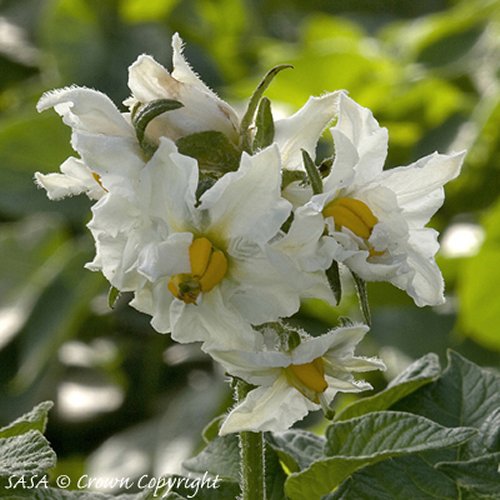Vivaldi potatoes are one of the most interesting varieties we have reviewed so far for a couple of reasons. The first is its great commercial success which is often understated. The key to its success is that is can be used as anything, from a baby First Early potato, right through to a large Maincrop potato.
We have classified Vivaldi as a Second Early, because harvested as a Second Early is probably showing it off at its best. But make no mistake, Vivaldi is an exceptionally good Maincrop variety. It is sold commercially in both forms.
The parents of Vivaldi are TZ 77 148 and Monalisa. It was bred by HZPC in the Netherlands who have been in the potato industry for over 130 years. Distribution rights in the UK were given to a company called "Naturally Best Packing".
Vivaldi potatoes were first released in 1986. It gained some notoriety several years later with claims that it contained less calories compared to other potato varieties - see this article here. However, the research behind this claim comes from research sponsored by the distributors of Vivaldi potatoes.
Not surprisingly, the claims were later proven to be not true.
When harvested as a First or Second Early, Vivaldi have thin light brown skins which do not need peeling. The flesh is light yellow and waxy with very good taste. The are ideal as salad potatoes and also are great served as roast potatoes with a creamy centre.
When harvested later in the year they grow much larger and take on a more floury Maincrop texture. They are superb, probably the best of all, as a baked potato.
Vivaldi potatoes have an average disease resistance profile, not out standing or poor in any area.
If you are growing Vivaldi as a salad potato they are excellent in containers. When growing them as a Maincrop / baked potato they do best in open ground.
The best time to chit / sprout Vivaldi potatoes is the first week of March in average areas of the UK.
Being primarily a Second Early variety it is well worth chitting / sprouting Vivaldi potatoes - it will give a more reliable crop although not absolutely necessary. Click here for our advice on how and why to chit / sprout potatoes.
The best time to plant out chitted / sprouted Vivaldi potatoes is about the first week of April in average areas of the UK.
Planting out on this date will give the chitted / sprouted potatoes about four weeks before they reach the surface of the soil. Whilst they are growing towards the soil surface the sprouts will be protected from frost by the surrounding soil.
By the time they do appear above the soil, the danger of frost will have passed and the sprouts will not be damaged by frost.
As with all vegetables, the time for harvest is dependent on many factors such as the weather conditions while they are growing and the general soil conditions.
On average however you can expect to start harvesting Vivaldi potatoes as salad potatoes in second week of July in average areas of the UK. If you plan to use them as Maincrop / baked potatoes, start harvesting them in early to mid August in average areas of the UK.
Using the above dates as a guide we would advise that a week before that date you use your hand to search through the soil to harvest one or two potatoes. The term often used for this activity is known in gardening circles as "furtling"!

Vivaldi flower
It does almost no damage to the remaining potatoes but allows you to examine one or two of the potatoes to ensure they are of approximately the correct size. If they are, start harvesting, if not wait for two weeks and try again.
Harvesting Vivaldi potatoes can be spread over two to three weeks. Be sure to read our page on storing potatoes to get the most from your crop of Vivaldi potatoes.
For other second early potatoes we have tested, select one from the drop down list below.
IF YOU HAVE ANY QUESTIONS OR COMMENTS
CONCERNING THIS PAGE, ENTER THEM BELOW.
WE WILL ANSWER ON
THIS PAGE AS SOON AS POSSIBLE